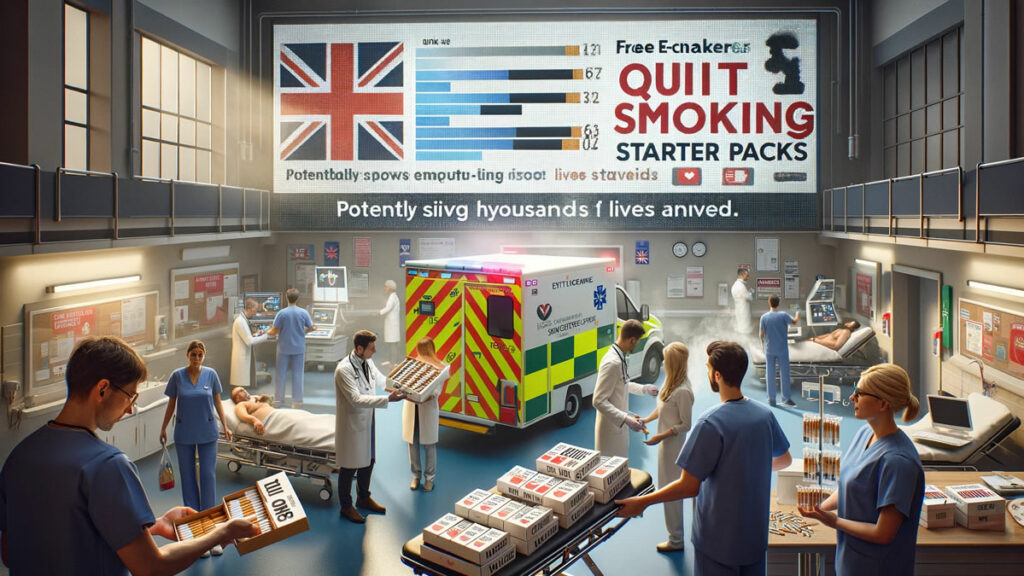A groundbreaking study conducted by researchers at the University of East Anglia (UEA) has found that providing free e-cigarette starter packs to smokers in hospital emergency departments significantly increases their chances of quitting. The trial, which took place across six UK hospitals, aimed to support smokers in their efforts to quit by offering them advice, an e-cigarette starter pack, and referral to stop smoking services.
Promising Results at Six-Month Follow-Up
The study, which involved 972 smokers who agreed to participate, randomly assigned participants to receive either the e-cigarette intervention or “usual care” written information about locally available stop smoking services. At the six-month follow-up, nearly one in four (23.4%) of those who received the e-cigarette starter packs reported having quit smoking, compared to just 12.9% in the usual care group. Furthermore, 7.2% of the intervention group and 4.1% of the usual care group had their smoking cessation confirmed through a carbon monoxide breath test.
Dr. Ian Pope, an emergency physician from UEA’s Norwich Medical School, emphasized the significance of these findings, stating, “Swapping to e-cigarettes could save thousands of lives. We believe that if this intervention was widely implemented, it could result in more than 22,000 extra people quitting smoking each year.”
E-Cigarettes as an Attractive Option for Smokers
Trial co-lead Prof Caitlin Notley, also from UEA’s Norwich Medical School, highlighted the potential of e-cigarettes as a tool to help smokers quit. “Electronic cigarettes mimic the experience of cigarette smoking because they are hand-held and generate a smoke-like vapor when used. They can be an attractive option for helping people switch from smoking, even if they have tried and failed in the past,” she explained.
Prof Notley also emphasized the reduced harm associated with e-cigarettes compared to traditional tobacco smoking, citing the severe impact of smoking-related diseases on quality of life and the substantial cost burden on the NHS.
Reaching Underserved Populations
The study, which was co-designed and managed with the help of Norwich Clinical Trials Unit, targeted neighborhoods with high levels of deprivation, where a higher proportion of participants were unemployed or unable to work due to sickness or disability compared to the average population.
Dr. Pope noted that the emergency department setting offers a unique opportunity to reach people who may not otherwise be motivated to quit or have access to stop smoking services. “This shows that helping people quit smoking whilst they wait in the emergency department is effective. It also shows that the emergency department offers a chance to reach people who may not otherwise be motivated to quit, or who might not have the knowledge or resources to access stop smoking services,” he added.
Calls for Wider Implementation
Based on the promising results of this study, the research team is hopeful that the initiative will be rolled out to hospitals nationwide. Dr. Pope concluded, “Based on these results, we feel hospital emergency departments are a valuable opportunity to support people to quit smoking and policymakers should seriously consider it as a location for smoking cessation interventions.”
As smoking remains a leading cause of preventable death and disease in the UK, innovative approaches like providing free e-cigarette starter packs in emergency departments could play a crucial role in reducing the burden of smoking-related illnesses and improving public health.
- Myanmar Enacts Total Ban on E-Cigarettes and E-Shisha - February 25, 2026
- UK Announces Mandatory Vape Tax and Duty Stamps from 2027 - February 10, 2026
- Sri Lanka Travel 2026: Total Ban on Cigarettes & Vapes - February 5, 2026


